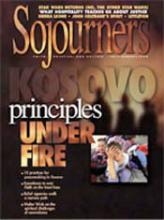With our family's move last year from urban Jackson, Mississippi, to small-town Vermont, I exchanged the blackest state for the whitest and neighborhood drive-bys for wild turkey dive-bys. Instead of 20-plus around a communal dinner table, now it's just our family's five, plus Grandma and Grandpa most nights. In a stillness broken only by Cub Scouts and chickadees, there are no earth-shaking meetings to attend, no lives in crisis to save.
My theology honed over 17 years of intense activism didn't prepare me for a place like this. Depression set in.
Martha of Bethany, an activist at heart, would have understood. It is deeply disturbing when the yardstick you have always used to measure your significance, even your devotion to God, is suddenly challenged. Martha holds two house parties, with the Messiah as guest of honor at both. While she slaves away serving, her sister Mary took a pound of very costly perfume of pure nard, anointed the feet of Jesus, wiped his feet with her hair, and filled the house with the fragrance of perfume (Matthew 26:6-13, John 12:1-8). A year's worth of a common laborer's salary. Dior with gold flecks has just been dumped on one who taught his disciples to feed the hungry and clothe the naked.
"Why this waste?" ask the indignant disciples. "This perfume could have been sold at a high price and the money given to the poor." Expecting an echo from Jesus, instead they get a reprimand. "Why are you bothering this woman? She has done a beautiful thing for me." At the second party, as Martha works, Mary sits still listening to Jesus. When Martha protests, Jesus' response is completely unfair. "You are worried and upset about many things, but only one thing is needed. Mary has chosen what is better, and it will not be taken away from her" (Luke10:38-42).
Read the Full Article
